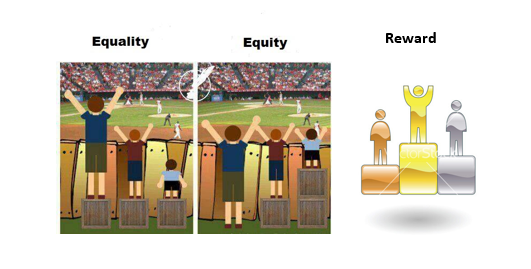
Joshua 14

“Justice” and “equality” are often trumpeted in today’s world as reasons for activism and rebellion. Other words such as “equity” and “social justice” are used as bases for policies in education, law and politics. A Christian who is caught up in this repetitive mantra may succumb to its enticing reason and forget to seek wisdom and guidance from the Bible.
Bible Passage: Joshua 14
The distribution of the land of Canaan was according to the size of the tribe – this is equality:
To a large tribe you shall give a larger inheritance, and to a small tribe you shall give a smaller inheritance. Each shall be given its inheritance according to those who were numbered of them.
(Numbers 26:54)
But Caleb was given a special piece of territory because of his faithful service to God and the nation – this is reward:
14 Hebron therefore became the inheritance of Caleb the son of Jephunneh the Kenizzite to this day, because he wholly followed the LORD God of Israel.
The country of Singapore decided at its beginning that it would run its affairs based on the principle of ‘meritocracy’, i.e., rule and reward by merit. For example, coveted government scholarships were disbursed based on the academic and leadership performance of the applicant and not on his connections, and importantly also, not on his financial status. Thus, bursaries for the needy were disbursed separately under the principle of equity, i.e. of levelling up.
The idea of meritocracy is based on the reasoning that rewarding those who are able will help recruit capable people whose work will then add more value to the organization. God endorses this kind of multiplicative rewarding in His kingdom as well:
Then came the first, saying, “Master, your mina has earned ten minas.” And he said to him, “Well done, good servant; because you were faithful in a very little, have authority over ten cities.” And the second came, saying, “Master, your mina has earned five minas.” Likewise he said to him, “You also be over five cities.” (Luke 19:16-19)
For I say to you, that to everyone who has will be given; and from him who does not have, even what he has will be taken away from him. (Luke 19:26)
The idea of equity is to help those who are disadvantaged in the first place and need a helping hand otherwise they may not be able to achieve anything at all.
And those members of the body which we think to be less honorable, on these we bestow greater honor; and our unpresentable parts have greater modesty … But God composed the body, having given greater honor to that part which lacks it … that the members should have the same care for one another. (I Corinthians 12:23-25)
While the parable of the minas (Luke 19:12-27) is based on reward for work done, the parable of the workers in the vineyard (Matthew 20:1-16) is based on the equality of the salvation grace of God:
But he answered one of them and said, ‘Friend, I am doing you no wrong. Did you not agree with me for a denarius? Take what is yours and go your way. I wish to give to this last man the same as to you. … So the last will be first, and the first last. For many are called, but few chosen.
(Matthew 20:13-16)
Thus, in life as in church, let us wisely decide the basis for a policy or a course of action. We should reward in proportion so that good work is acknowledged and further good work is encouraged. We should act with equity, giving to those who need more, when such giving is necessary for a person to get on his feet. We should act with equality when no one deserves or needs an extra helping.



One Comment
Camelinaneedle
I think most times, what is lacking in the church is the social awareness.
A lot of times, we remain ignorant about the people around us and keep our gaze on ourselves (myself included).
We spend less and less time caring about/ for the needs of other people even though their needs may surpass that of our own at any moment.
So we need to learn to be fair to one another, and give each other the time and the resources we need.
As hard as this may be to accomplish, we need to do unto others what we would like others to do unto us.